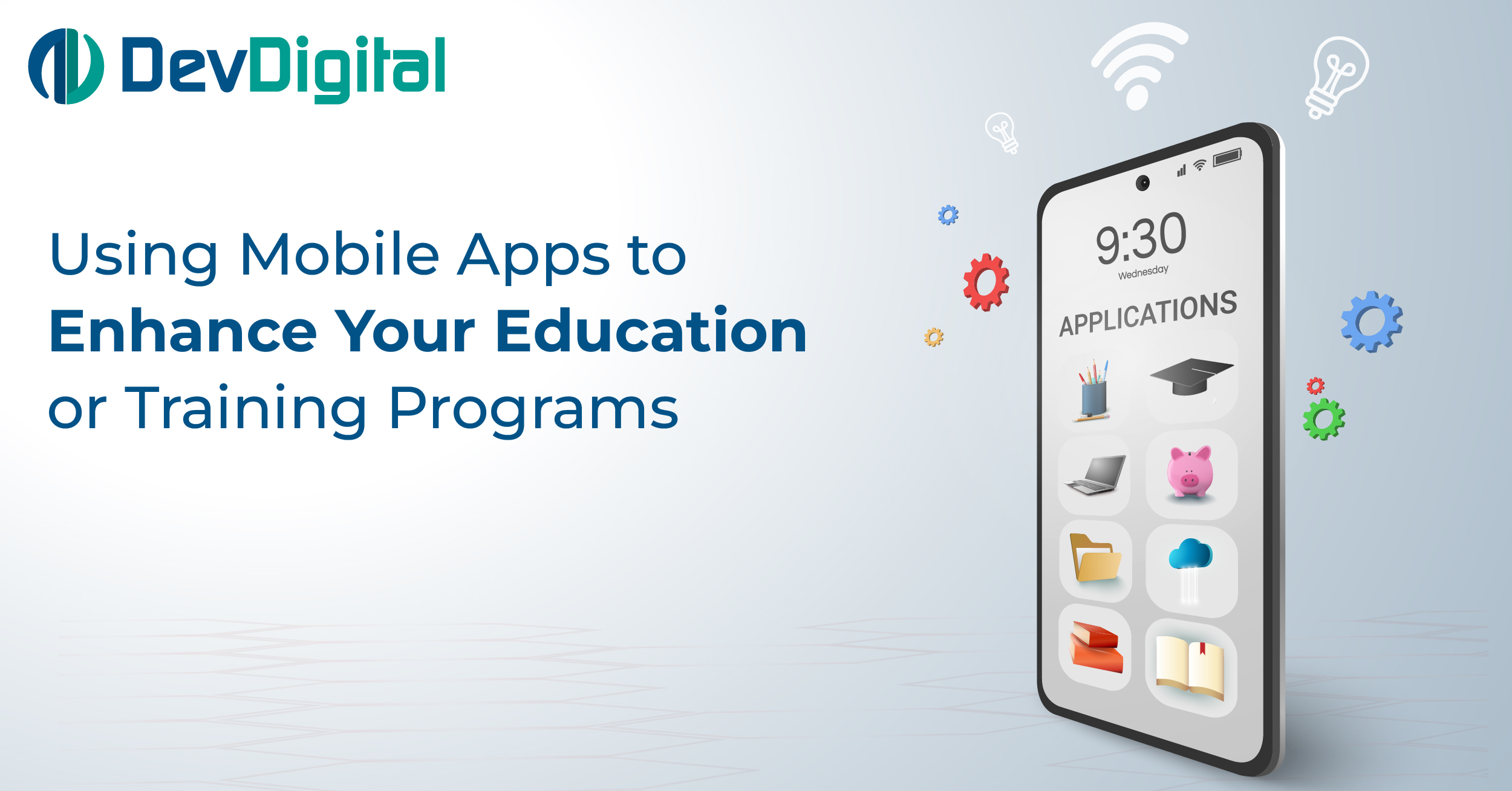Blog
Using Mobile Apps to Enhance Your Education or Training Programs
October 11, 2022
Posted by: DevDigital
Smartphones are ubiquitous and versatile tools for commerce, education, and more. Education providers of all kinds realize that mobile apps are valuable learning tools. Therefore, so many companies offer free or cheap apps for things like language learning and math. Businesses and universities have found creative ways to use games and other learning aids on mobile phones and tablets. This post is a review of some of the possibilities for any education provider.
How to Use a Mobile Learning App
A mobile app could be programmed to carry out a variety of learning functions, including many of the things you would normally do in a cloud-based learning management system (LMS).
- Self-Paced Lessons – The flexibility to complete lessons on their own schedule can boost a course’s completion rate and time.
- Gamification – Trivia games and simulations can be valuable. Changing a complex procedure and sending out a memo after changing the relevant software may not work.
- Exercises – Less ambitious than creating a game but valuable for most any learning situation. Deliver pop quizzes, problems to solve, matching exercises, short answer questions, and more.
- Guided Practice – A language-learning app uses a chatbot to help learners practice. Another AI-driven chatbot could help a sales rep practice a new selling technique.
- Collaboration – While most training and education apps probably focus on one learner and their supervisor or teacher, they can also support team exercises, peer review, and even group problem-solving initiatives.
Those mobile learning options promise to deliver several benefits, depending on the subject and setting.
Benefits of Mobile Learning
The most obvious benefit of using a mobile app for education is flexibility. Students who can complete their lessons and do their assignments at a convenient time or location are going to be a little more motivated and a little more productive. Life gets busy and doing another module in a course can slip down someone’s list of priorities, especially when you don’t have access to a desktop or laptop in that moment. Having access to mobile learning in the palm of your hand makes mobile learning so convenient.
The main benefit of creating a mobile learning application is probably efficiency, from a corporate perspective; flexibility, from the individual learner’s perspective. These are among several educational benefits:
- Personalized learning – In common with cloud-based learning software, mobile learning apps can offer personalized learning. This could be done in at least two ways. The software responds to users’ quiz scores, giving some learners more practice and passing others to the next section automatically. A corporation could create different learning paths with different courses to match different roles.
- Easy ability to track progress – Many, if not all, existing mobile learning apps share data so students and other authorized users, such as supervisors at work, can check on each learner’s progress.
- Easy access to supplemental materials – A mobile app can offer access to reference materials, answers to homework questions, solutions to exercises, and more.
- Money saved – As mobile learning is place-independent, it does not require travel or a dedicated classroom space.
- Lower environmental impact – Mobile learning apps are much “greener” than in-person training that is conducted in another city. As a digital medium, there are no paper documents to print either.
- Higher learner engagement – This can be an overlooked benefit in the business world, but the more learners want to focus on the learning at hand, the faster they might progress through the lessons and the more they can retain.
Advanced mobile app features like augmented reality may become more important as time passes.
Mobile Learning Options
Creating a custom mobile application is a viable option. However, many companies offer free or cheap E-learning apps for various applications, from teaching children a foreign language to solving complex math problems for engineers and physical science students. There are even free or cheap apps for learning Python, SQL, and Java. Quiz apps covering languages and math exist too. Consider finding one or two and incorporating them into an E-learning program as supplemental resources. Remember that the YouTube mobile app is free and offers access to a wide variety of instructional material and documentaries at no cost.
The second option is obviously to buy a commercial subscription to an existing app. This is a straightforward way to supplement your cloud-based training program or a desktop app but with one clear limitation. If a suitable app exists, it might not be a perfect fit.
Finally, you can hire developers to create a custom app just for your organization (which is the best option), either for internal use or for students. This may be the best way to realize all the benefits of using a mobile app for education. A fully customized app is tailored to the client’s exact education requirements. The app may also be useful for customers, where it could be branded to match the company’s image and used as a differentiator by an education provider looking for a way to stand out in consumers’ minds.
Mobile Learning Tools Offer Many Opportunities
Whether your interest is strictly in corporate training or in helping parents who home school, or anything else related to learning, mobile education applications offer opportunities and advantages. Off-the-shelf products can work, but often investing in a custom application is the best option and makes the most sense in terms of reinforcing your brand, meeting a specialized learning requirement, or offering a differentiator in a competitive landscape. If you are interested in mobile learning, we invite you to contact us and schedule a brief conversation.
